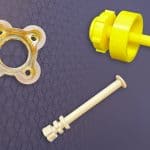An Informational Brief on Polymer Machining
Polytetrafluoroethylene (PTFE) is a fluorocarbon-based polymer, known more commonly as Dupont’s brand name Teflon®. The enhanced electrical properties, high-temperature capabilities and chemical resistances of this thermoplastic make it a favorite for backup rings, coatings, distribution valves, electrical insulation applications and more.
Our latest machining guide discusses what goes into machining Teflon and how its considerations differ from other manufacturing options such as metal machining, injection molding, and 3D printing.
Read on to learn more about Teflon’s machining, applications and properties in AIP’s informational polymer brief below, starting with the difference between working with a thermoset and a thermoplastic.
Machining Thermoplastics vs Thermosets
We’ve already said that Teflon is a thermoplastic, but what does that mean exactly?
All polymers can more or less be divided into two categories: thermoplastics and thermosets. The main difference between them is how they react to heat. Thermoplastics like Teflon, for example, melt in heat, while thermosets remain “set” once they’re formed. Understanding the technical distinction between these types of materials is essential to CNC machining them properly.
What type of thermoplastic is Teflon in particular? PTFE is a fluoropolymer, making it a semi-crystalline thermoplastic. As a fluoropolymer, PTFE possesses an inherent high resistance to solvents, acids and bases.
Properties & Grades of Machined Teflon
Teflon has excellent electric stability in a wide range of conditions and environments, and its coatings are popular in the aerospace sector. Offering excellent chemical resistance and sliding properties, PTFE finds many applications in seals, housings, linings and bearings. Teflon also maintains very good UV resistance, hot water resistance and electrical insulation at higher temperatures.
Unfilled PTFE is chemically inert and has the highest physical and electrical insulation properties of any Teflon grade. Mechanical grade PTFE is often made up of reground PTFE and exists as a cost-effective alternative for industries that don’t require high purity materials while providing superior compressive strength and wear resistance to virgin Teflon.
There are several different modified PTFE materials available with unique properties. Many of these modified grades offer greatly reduced deformation percentages under load, as well as a lower coefficient of friction. These include glass-filled, nanotube, synthetic mica and carbon-filled grades. Teflon (PTFE) is more commonly used as an additive to numerous other base polymers in order to provide reduced friction and wear properties.
Some of the PTFE grades we regularly machine at AIP include FLUOROSINT 207, FLUOROSINT 500, DYNEON, SEMITRON, ESD 500 HR, and SEMITRON PTFE.
Machining Teflon
Annealing & Stress Relieving Teflon
The process of annealing and stress-relieving PTFE reduces the likelihood of surface cracks and internal stresses occurring in the material. Post-machining annealing also helps to reduce stresses that could potentially contribute to premature failure. AIP’s special annealing process for Teflon is designed to take the specific properties of PTFE into account, and we advise anyone working with PTFE to hire a manufacturer that understands its unique demands.
Machining Teflon
PTFE’s density and softness make it deceptively easy to machine, and in virgin grade, has a temperature range from -450°F to +500°F (-267.7°C to +260°C). Teflon has low strength when compared to materials like Nylon, which has almost two to three times the tensile strength of Teflon. You’ll want to use extremely sharp and narrow tools to work with this material.
Teflon’s high coefficient of expansion and stress creep properties can make it difficult to achieve tight machining tolerances. It’s essential to design your application with PTFE’s inherent properties in mind, instead of trying to force the polymer to act against its nature.
We also suggest non-aromatic, water-soluble coolants, such as pressurized air and spray mists, to achieve optimum surface finishes and close tolerances. Coolants have the additional benefit of extending tool life as well.
Preventing Contamination
Contamination is a serious concern when machining polymer components for technically demanding industries such as medical and life sciences. To ensure the highest level of sanitation down to the sub-molecular level, AIP Precision Machining designs, heat-treats and machines only plastics, with any sub-manufactured metalwork processed outside our facility.
Teflon Machining Guide: Supportive Information
Or request a quote here






